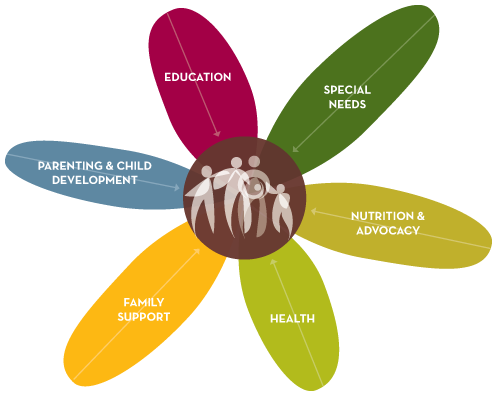Skilled care delivered at home—combined with center-based support—keeps families together and moving forward.
We provide the interventions and care that vulnerable, at-risk families need over the short term. But we also look beyond their immediate needs to see how they can achieve lasting stability and growth. We do that by building caring, respectful relationships and offering multiple services, which over time will boost family health and well-being.

Our model offers a special focus on:
- Parenting and early childhood development and health
- Nursing care for mothers, infants and young children
- Family health issues, like asthma, diabetes, depression and abuse
- Advocacy for families needing assistance with housing, food, legal aid—or any short-term crisis.
Home Visits
Caring for our clients at home allows us to build trusting, mutual relationships that help them heal, draw them out from the shadows of isolation, and build a support community with LSA as their cornerstone.
That’s why the vast majority of our programs feature a core home visiting component involving skilled nurses, community health workers, social workers, cliniciansband case managers.
Combined with support from our on-site advocates and staff, along with program components that strengthen and augment the work done during home visits (including early childhood socialization classes, academic tutoring programs, breastfeeding support groups and a variety of workshops), our home-based holistic service model is virtually unmatched in NYC. That’s the LSA difference.
Mutual Relationships
For over 50 years, the concept of mutual relationships has been at the core of our mission. In a world too often marked by fragmentation, we believe that only genuine relationships will create a supportive, caring community, and that those who interact with each other will mutually grow.
At LSA, we’ve learned through experience that when our professional relationships with our clients involve the personal—the human—our impact deepens while growth is fostered within us all.
A Focus on Families and Children
Financial hardship, crisis and poverty directly impact the health, stability and growth of families, particularly infants and small children. That’s why LSA Family Health Service has a special focus on the needs of families with babies and young children.
The youngest members of the family suffer disproportionately from poverty, because they’re the most vulnerable and least resilient, especially when chronically impacted by the effects of poverty, poor nutrition, substandard living conditions, inferior or no health care and toxic stress.
Through home visits and on-site services and support from almost all of LSA’s programs, such as Nursing, Parenting and Child Development, and Environmental Health, we measurably improve the lives of the youngest and most vulnerable by keeping them healthy, on-track developmentally, and growing towards lives full of possibility.
